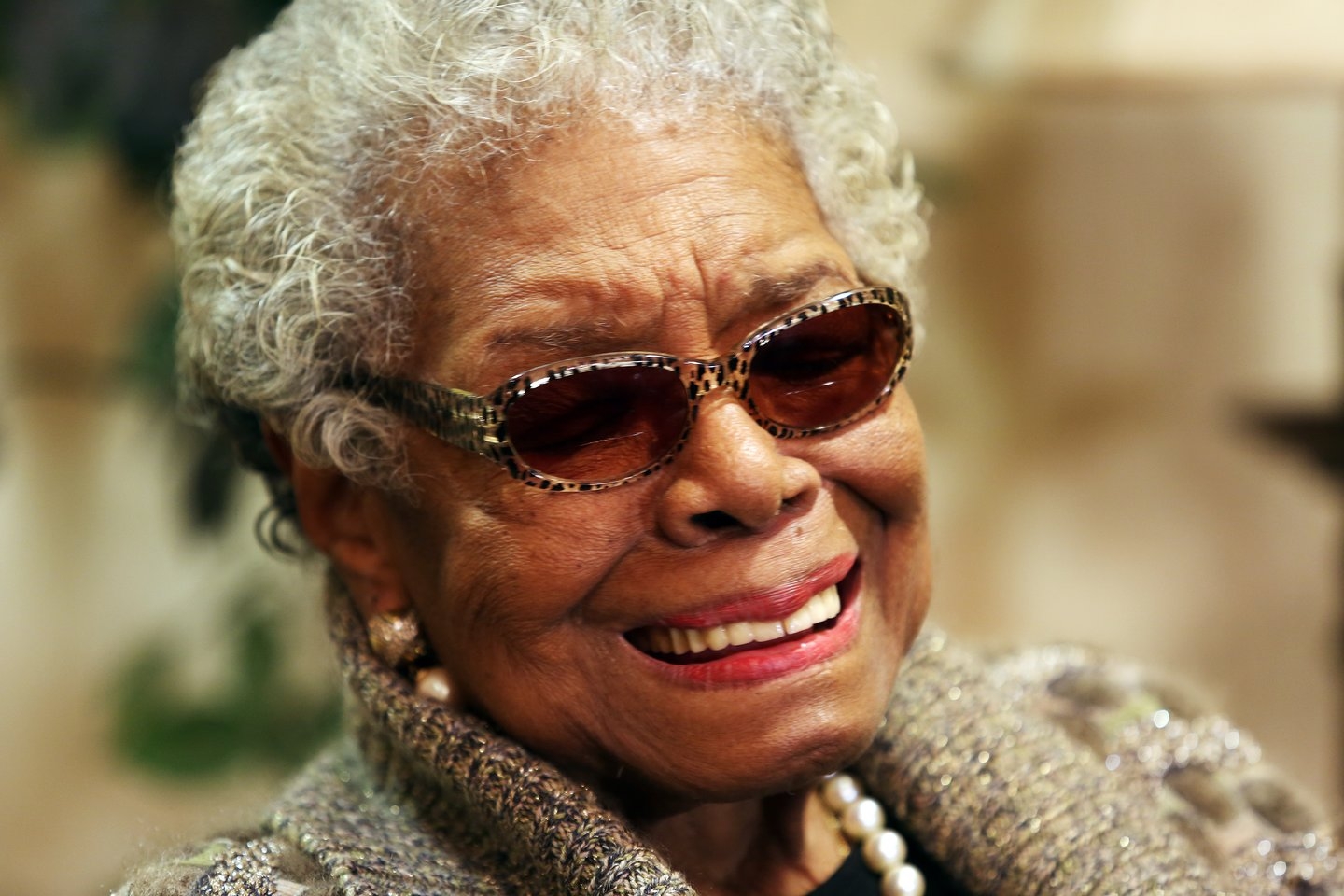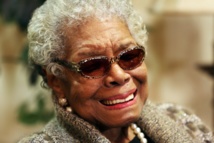Her son Guy Johnson said his mother "passed quietly in her home" in Winston-Salem, North Carolina and expressed thanks that "her ascension was not belabored by a loss of acuity or comprehension."
"She lived a life as a teacher, activist, artist and human being. She was a warrior for equality, tolerance and peace," he said.
President Barack Obama led the tributes, hailing Angelou as "one of the brightest lights of our time - a brilliant writer, a fierce friend, and a truly phenomenal woman."
Former President Bill Clinton, who invited Angelou to give a reading at his 1993 inauguration, said America had "lost a national treasure."
"The poems and stories she wrote and read to us in her commanding voice were gifts of wisdom and wit, courage and grace," Clinton said in a statement.
Angelou's close friend television icon Oprah Winfrey spoke of Angelou's "unshakeable calm, confidence and fierce grace."
"She will always be the rainbow in my clouds," Winfrey said.
Angelou had reportedly been in poor health, and had cancelled a scheduled appearance in Texas where she was to have accepted an honor later this week.
- 'Listen to yourself' -
"Listen to yourself and in that quietude you might hear the voice of God," she wrote in what would become her last message on her @DrMayaAngelou Twitter account, posted on May 23.
Born Marguerite Annie Johnson on April 4, 1928, in Saint Louis, Missouri, Angelou experienced hardship from an early age -- her parents' breakup, racial segregation and, at the age of seven or eight, rape at the hands of her mother's boyfriend.
The traumatic impact of the sexual assault and its aftermath -- her attacker was murdered -- saw Angelou retreat into a self-imposed silence for six years, a period where she first began writing.
"I thought, my voice killed him; I killed that man, because I told his name. And then I thought I would never speak again, because my voice would kill anyone," she wrote.
She moved to San Francisco during World War II to study dance and acting, where she also held down a number of odd jobs -- including a stint as the city's first black female cable car conductor -- to support herself and a baby son.
In the early 1950s she briefly married a Greek sailor named Anastasios Angelopulos. She tweaked his surname to come up with her own professional name, which she first used as a calypso dancer.
The same decade found Angelou on the stage, performing in off-Broadway theater and in a touring production of "Porgy and Bess." At the same time she became increasingly involved in the nascent civil rights movement, getting to know many of its key figures.
- Travelled abroad -
In the 1960s she traveled abroad, spending much of that tumultuous decade in Egypt and Ghana.
Upon returning to the United States, the African-American author James Baldwin encouraged her to put pen to paper with her remarkable life story -- encouragement that led to the publication of "I Know Why the Caged Bird Sings," which covered the first 17 years of her life.
A small library of books and poems would follow, as well as a screenplay (the 1972 Swedish-American drama "Georgia, Georgia") and an Emmy-nominated turn on the breakthrough US television miniseries "Roots" in 1977.
Angelou's recording of one of her most famous poems, "On the Pulse of the Morning," at Clinton's 1993 presidential inauguration went on to win a Grammy award.
Angelou made her debut as a director with the 1998 film "Down in the Delta," about a young big city drug addict dispatched to the ancestral home in rural Mississippi where she discovers her family roots.
She also published cook books and, in 1996, narrated a Sesame Street children's film titled "Elmo Saves Christmas."
Barack Obama presented Angelou with the nation's highest civilian honor, the Presidential Medal of Freedom, in 2011.
----------------------------------------------------------------------------------------------------------
"She lived a life as a teacher, activist, artist and human being. She was a warrior for equality, tolerance and peace," he said.
President Barack Obama led the tributes, hailing Angelou as "one of the brightest lights of our time - a brilliant writer, a fierce friend, and a truly phenomenal woman."
Former President Bill Clinton, who invited Angelou to give a reading at his 1993 inauguration, said America had "lost a national treasure."
"The poems and stories she wrote and read to us in her commanding voice were gifts of wisdom and wit, courage and grace," Clinton said in a statement.
Angelou's close friend television icon Oprah Winfrey spoke of Angelou's "unshakeable calm, confidence and fierce grace."
"She will always be the rainbow in my clouds," Winfrey said.
Angelou had reportedly been in poor health, and had cancelled a scheduled appearance in Texas where she was to have accepted an honor later this week.
- 'Listen to yourself' -
"Listen to yourself and in that quietude you might hear the voice of God," she wrote in what would become her last message on her @DrMayaAngelou Twitter account, posted on May 23.
Born Marguerite Annie Johnson on April 4, 1928, in Saint Louis, Missouri, Angelou experienced hardship from an early age -- her parents' breakup, racial segregation and, at the age of seven or eight, rape at the hands of her mother's boyfriend.
The traumatic impact of the sexual assault and its aftermath -- her attacker was murdered -- saw Angelou retreat into a self-imposed silence for six years, a period where she first began writing.
"I thought, my voice killed him; I killed that man, because I told his name. And then I thought I would never speak again, because my voice would kill anyone," she wrote.
She moved to San Francisco during World War II to study dance and acting, where she also held down a number of odd jobs -- including a stint as the city's first black female cable car conductor -- to support herself and a baby son.
In the early 1950s she briefly married a Greek sailor named Anastasios Angelopulos. She tweaked his surname to come up with her own professional name, which she first used as a calypso dancer.
The same decade found Angelou on the stage, performing in off-Broadway theater and in a touring production of "Porgy and Bess." At the same time she became increasingly involved in the nascent civil rights movement, getting to know many of its key figures.
- Travelled abroad -
In the 1960s she traveled abroad, spending much of that tumultuous decade in Egypt and Ghana.
Upon returning to the United States, the African-American author James Baldwin encouraged her to put pen to paper with her remarkable life story -- encouragement that led to the publication of "I Know Why the Caged Bird Sings," which covered the first 17 years of her life.
A small library of books and poems would follow, as well as a screenplay (the 1972 Swedish-American drama "Georgia, Georgia") and an Emmy-nominated turn on the breakthrough US television miniseries "Roots" in 1977.
Angelou's recording of one of her most famous poems, "On the Pulse of the Morning," at Clinton's 1993 presidential inauguration went on to win a Grammy award.
Angelou made her debut as a director with the 1998 film "Down in the Delta," about a young big city drug addict dispatched to the ancestral home in rural Mississippi where she discovers her family roots.
She also published cook books and, in 1996, narrated a Sesame Street children's film titled "Elmo Saves Christmas."
Barack Obama presented Angelou with the nation's highest civilian honor, the Presidential Medal of Freedom, in 2011.
----------------------------------------------------------------------------------------------------------









 Home
Home Politics
Politics











